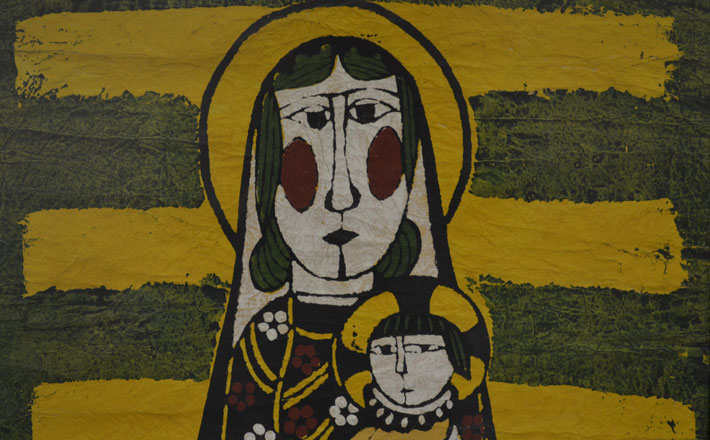Commentary on Isaiah 52:7-10
This passage is joyfully noisy.
First, the messenger announces and speaks. Then, sentinels lift up their voices in a song of joy. Finally, Jerusalem herself joins in the cacophonous acclamation of God’s deeds. The good news of what God has done is too good to be quietly noted. One must give voice in witness and praise such that even the ends of the earth shall see God’s acts of salvation.
On Christmas morning the focus of one’s preaching rightly focuses on the incarnation, on God Almighty taking on flesh and blood to dwell among humanity. This reading from Isaiah, written long before the advent of the Christ child, bears witness of God as savior and reminds us that while the incarnation is most certainly something new, God as savior is not new but a part of who God is — something that had already been praised for centuries.
The passage, as befits a celebration of incarnation, emphasizes the bodily nature of witness and praise. The feet of the messenger are beautiful (vs. 7). Sentinels lift up their voices (vs. 8). The LORD bears an arm before the eyes of the nations (vs. 10). Much of this language is metaphoric and metonymic. The body imagery reminds us that neither the work of God nor the praise humans render are tasks of the mind but rather involve our whole beings, even our bodies.
The voice of the messenger
The messenger announces a number of things: peace, good news, salvation, and that Zion’s God reigns (vs. 7). It is a reversal of things that had previously been spoken to Zion. The verses just prior to this pericope recount two events from Zion’s history: the Exile (vs. 3) and the Exodus (vs. 4). Just as God had led the Israelites out of slavery in Egypt, so God is now leading the exiles home. Instead of war — experienced at the hand of both Assyria and Babylon — they now will have peace. Their God reigns.
Statements proclaiming the reign of the LORD occur throughout the Old Testament, primarily in the books of Psalms, Isaiah, and Zechariah. These statements are often praises that claim God as ruler over all nations (cf Psalms 47 and 97-99) or as one who established the orders of creation (Psalm 93). In the ancient Near Eastern context, wars were thought to be an earthly reflection of gods fighting in the heavens. The statement that Zion’s God reigns signifies both the power of the LORD and a rejection of the power of other kings or gods.
The Old Testament also attests to a tense relationship between the LORD as king and the human king reigning on the throne of Israel. The people’s request for a king in 1 Samuel 8 is interpreted as a rejection of the kingship of the LORD, while in 2 Samuel 7 the promise to King David is that his descendents would sit on the throne of Zion forever. The statement here may be understood both as in line with the many statements praising the kingship or reign of the LORD and as a reassertion that regardless of earthly power structures, it is the LORD rather than a human who truly reigns.
The voice of the sentinels
The sentinels proclaim that the LORD has returned to Zion (vs. 8). Does this mean that God was missing? Like the news that God reigns, this phrase requires some consideration of the worldview of Jerusalem in the 6th century BCE. When the Babylonians destroyed Jerusalem in 587 BCE, the temple — the visible sign of God’s presence — was also destroyed. What kind of God allows the divine house to be destroyed? One who no longer intends to live in it. Thus, the general world view would have been that the LORD had abandoned Zion or had been defeated by another god. Whether these statements accurately describe the presence of the LORD or not does not much matter for this particular passage. What this poem proclaims — what these sentinels proclaim — is that it is again visibly clear that the LORD dwells in Zion. The restoration proclaimed can be nothing other than the work of God present in Zion.
The voice of Jerusalem
Finally, Jerusalem is encouraged to add her voice to the cacophony of praise. More specifically it is the ruins or wastelands of Jerusalem who is told to break forth into singing (vs. 9). The city Jerusalem, also called Zion, is personified as a woman in a number of places in the Old Testament. Her embodiment accomplishes several things. It allows for closer empathy with the condition of the people and physical structures of Jerusalem, whether in a state of destruction or repair. It enables the whole of the people of Jerusalem to be understood as one — unified in emotion and speech. It also allows for a number of relational metaphors between the people of Jerusalem and the LORD. In the books of Jeremiah, the early part of Isaiah, and Ezekiel, Jerusalem is portrayed as God’s wife — often unfaithful. In the book of Lamentations, she is portrayed as the daughter of the LORD who calls out to others to see her pain and boldly accuses God for what has befallen her. In this portion of Isaiah, she is called to praise in the face of hope. Still in ruins, she is given news of comfort and redemption. Still in ruins, she is called to sing praise of God who acts on her behalf. Still in ruins, she is called to bear witness of her salvation to the all nations, even to the ends of the earth.


December 25, 2014